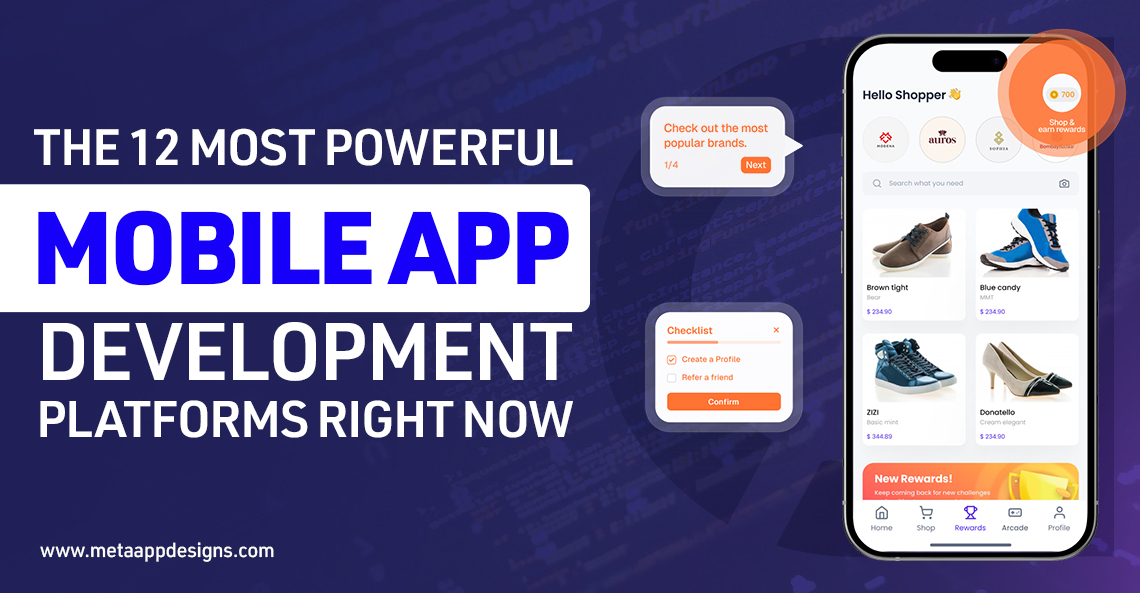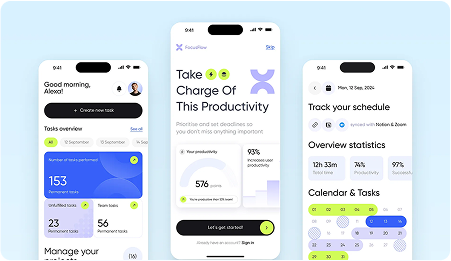
The 12 Most Powerful Mobile App Development Platforms Right Now
Mobile apps offer great value today. Besides, mobile app development is an essential business tool that drives marketing for firms and helps them engage more people. Also, it improves their working methods and provides users with quick access to information and other services.
Thank you for reading this post, don't forget to subscribe!
Apps enable firms to smoothly engage clients through distinct offers and push messages. Besides, they help them build brand value. However, to create a winning mobile app, you must choose a powerful mobile app development platform.
The right platform helps you create high quality and useful apps. Besides, these match your precise business goals, budget, and user needs. Also, they are scalable, cost efficient, quicker to market, and simpler to maintain. In short, a solid and proper mobile app development platform allows for the creation of apps that perform well and offer great user encounters. This is vital for staying connected with a global user base in today’s market.
In this article
This article will explore the twelve most powerful mobile app development platforms right now. It will also explain how mobile app developers can use these platforms to help firms thrive in today’s market.
Why Do You Need the Right Mobile App Development Platform Today?
Table Of Content
The mobile app development platform you choose impacts the app’s quality and performance. In short, it helps retain more users.
Performance
Choosing the right platform is vital to ensure the app performs well. Besides, it supports custom mobile app development and controls whether the app can handle more users and data.
Cost-Efficient
The right platform can reduce design complexity and overall costs. Besides, it can help mobile app developers speed up the design process. As a result, it makes app design more cost-efficient for many companies.
Faster Time to Market
Many modern platforms offer reusable code and streamlined workflows. As a result, you can get your app to users more quickly.
Enhanced User Encounters
The right platform supports distinct features like push alerts and location-based services. As a result, it creates a smoother user encounter.
Broader Reach
A framework that supports cross platform design allows your app to be used on both iOS and Android. As a result, it helps you reach more users.
12 Most Powerful Mobile App Development Platforms Right Now
The most powerful mobile app development platforms in 2025 are multiple. They include cross-platform frameworks and options for platform-precise design.
1. Android Studio
This platform is the Integrated Development Environment for native Android design. Besides, it features advanced tools for building apps with Kotlin and Java.
Android Studio is a solid platform, mainly due to its detailed feature set and working with the Android ecosystem. Besides, it receives direct support and updates from Google. As a result, it works well with the latest Android versions and features.
Rich Feature Set
Android Studio offers a complete suite of tools for custom mobile app development. It includes a smart code editor and a visual layout editor for UI design. Besides, it includes fast and feature-rich options for testing across diverse devices.
Gradle-Based Build System
The flexible Gradle-based build system streamlines the build process. Besides, it allows for tailored options to build many variants.
Testing Tools
Android Studio provides many testing tools and frameworks. Besides, it supports testing on diverse device options.
Language Support
The platform supports coding languages for Android custom mobile app development. As a result, it offers multiple options for mobile app development services.
2. Xcode
Xcode is Apple’s powerful IDE for native custom mobile app development. Besides, it is known for its support of Swift and a visual UI builder.
Xcode is a strong mobile app platform mainly due to its working with the Apple system. Also, its detailed set of tools designed for Apple platforms makes it a great platform.
Smooth Working with the Apple System
Xcode works well with Apple’s hardware and software. Besides, it offers direct access to Apple’s frameworks and seamless workflows.
Toolset
Xcode offers proper performance tools within a single interface.
Built-in Testing Tools
The best mobile app development services can test apps on virtual Apple devices. Besides, they can use proper testing tools for UI testing. As a result, they can ensure app quality.
Perfect for Apple Hardware
Xcode can reap the benefits of Apple’s hardware. As a result, this leads to smart design and improved app performance on Apple devices.
Updates
Xcode receives constant updates that align with new iOS and macOS releases. As a result, it ensures mobile app developers can use the latest platform features.

3. SwiftUI
SwiftUI is strong now due to its syntax for faster, cleaner code, and real-time previews for quick app design. Besides, its cross-platform options with a single codebase help reduce design time. Also, it allows for the creation of striking and inclusive apps across all Apple devices.
Syntax
Instead of writing code, mobile app developers describe the desired user design. As a result, it leads to less error prone code.
Cross Platform Support
SwiftUI allows you to write a single codebase that runs across all of Apple’s platforms.
State Management
The framework handles design updates based on changes in app state. As a result, it streamlines the process of keeping the design in sync with data.
Simpler Graphics
SwiftUI makes it easy to create complex and smooth graphics with basic code.
Built-in Access and Dark Mode
The framework provides support for dynamic app features. As a result, it makes it simpler for mobile app developers to create distinct apps.
Faster Design
The nature and built-in tools of this platform reduce the amount of boilerplate code. As a result, it speeds up the design process.
4. Flutter
This is a mobile app development platform known for its fast performance and native like design.
Reload and Restart
These features enable mobile app development services to see changes to their code instantly without restarting the app. Besides, it boosts the design and debugging process. Also, this rapid option fosters a smarter design process.
User Design
Flutter uses a rich set of widgets. Besides, these allow experts to craft striking user interfaces that maintain a great look and feel across diverse devices and platforms. Also, the platform’s unique rendering engine ensures solid visuals and performance.
High Performance
Flutter apps are compiled into machine code. This helps ensure near native performance. As a result, it avoids the overhead linked with other cross platform frameworks that rely on web views.
5. React Native
This is a well-known JavaScript framework and a strong platform.
Near-Native Performance
Unlike some other cross platform options that rely on web views, React Native uses actual native elements. Besides, this allows apps built using the platform to achieve a look, feel, and performance like truly native apps. As a result, it ensures a smooth app for users.
Cost-Effective
The option to share a single codebase across platforms ensures lower design and maintenance costs.
Strong Ecosystem
React Native benefits from proper support and a wealth of third-party tools. As a result, this rich ecosystem enhances design outcomes.
Component Reuse
The component-based nature of React Native promotes code reuse. As a result, it allows mobile app development services to build modular elements that can be used throughout the app.
6. Ionic
This is a framework for building hybrid mobile apps using web techniques. Besides, it remains a strong app design platform as it offers a rich set of pre designed parts and robust plugins.
Apps built using Ionic look good and perform well. Besides, they are feature rich.
Rich UI Parts
Ionic provides many pre-designed parts and tools. As a result, experts can build appealing and native-looking app designs quickly.
Access to Native Features
By working with the Capacitor plugin system, experts can use the platform to access native device features.
High Performance
Ionic apps are built for performance. Besides, they include features and transitions that help ensure a smooth user interface for the app.
Future-Proof Structure
Built on open standards, Ionic provides a simple and future-proof basis for modern custom mobile app development.
7. NativeScript
This is a solid platform as it allows experts to build truly native iOS and Android apps using a single codebase. Besides, it provides direct access to native APIs. As a result, it ensures high performing apps that use native UI parts rather than web views.
Using this platform ensures a smooth user encounter. Besides, it reduces design time compared to native design. As a result, it offers ease through diverse frameworks and a plugin ecosystem.
Direct Access to Native APIs
The best mobile app development services can access and use all native iOS and Android APIs using this platform. Besides, it allows for working with device features and other platform-precise functions without needing plugins for basic features.
Language & Framework Ease
The platform supports known frameworks. Besides, it allows experts to use popular tools to build their native apps.
Rich Plugins
The platform has many pre-built plugins. As a result, it boosts the design process with ready-to-use parts for diverse functions and options.

8. Xamarin
Xamarin remains a strong platform today. This is because it shares a great amount of code. As a result, it provides native like performance at a reduced cost and faster time to market.
Code Reuse
Experts can write a single codebase and reuse most of it across diverse platforms. As a result, it reduces design time and costs.
Native Performance and UI
Xamarin provides native-level access to platform APIs and hardware. As a result, it ensures apps perform well and have a native look and feel.
Native APIs and Hardware Access
Xamarin offers full access to native platform APIs and hardware features through plugins. As a result, experts can create decent apps.
Testing
The platform supports cloud-based testing across diverse platforms. Besides, it offers strong security features. As a result, it ensures quality and reduces the need for multiple physical devices.
9. Kotlin Multiplatform
Kotlin Multiplatform is a solid mobile app development platform due to its unique approach to cross-platform design. Besides, it balances code reuse with native options.
Code Reuse for Business Logic
KMP allows experts to write the business logic and data models once and share them across diverse platforms. As a result, it reduces design time and effort and ensures consistency across platforms.
Performance
KMP enables the use of native UI parts for each platform. Besides, it ensures proper performance and a truly native look and feel.
KMP uses the Kotlin language, which offers benefits for custom mobile app development. As a result, it makes it a natural choice for smooth working with Java-based projects.
Adoption
KMP’s structure allows for slower adoption. This means teams can start by sharing small modules and expand code sharing as needed. As a result, it makes it simpler to integrate KMP into current projects without a complete overhaul.
10. Softr
Softr is a powerful no code platform for building web apps and Progressive Web Apps (PWAs). Besides, it uses a simple interface and pre built templates. Also, its strengths include a fast design process, simple parts, and safe user logins. As a result, it is a perfect choice for creating diverse business apps and client portals without coding.
Pre-built Templates
The mobile app development platform offers many pre-designed templates. These become a starting point for diverse use cases. As a result, it boosts design time.
Database
Softr connects to databases, serving as the backend for app data and logic.
User Management
The platform includes built-in features for signup and password resets. As a result, it enables secure access to your apps.
11. Budibase
Budibase stands out as a powerful mobile app development platform. Besides, its open-source nature allows for more design control. Also, experts can edit the code as needed. As a result, it enables self-hosting and provides more control over data and structure.
Rapid Design Options
Budibase offers many pre-built templates. This improves the app design process. As a result, it allows users to quickly assemble apps without starting from scratch.
Focus on Tools
The platform excels at building admin dashboards and approval workflows.
Dashboards
The platform is great for creating live data dashboards. As a result, it enables firms to track vital metrics and make the right decisions.
12. NocoBase
NocoBase is a strong platform because of its open-source nature and data model-driven design. Besides, it has a solid plugin system. As a result, it allows experts to build complex and tailored mobile apps.
Open-Source
As an open-source platform, NocoBase provides control over data and code.
Data Model-Driven Design
Unlike many platforms, NocoBase’s data model-driven approach provides more powerful design options for complex, data-rich apps.
Plugin System
The platform remains lightweight by using plugins. Besides, users can add new functions and tailor the platform by adding or using new plugins, which is a great benefit.
Supports Complex Logic
NocoBase is not limited to simple apps. Besides, it is built to handle complex business logic and system options. As a result, it is perfect for building complex business apps.
Final word
Mobile apps are vital for business in today’s landscape. However, using the right platform for mobile app development helps your business remain relevant.
A robust mobile app requires a platform offering strong features and update options. Besides, the best platforms support quality testing. So, wait no longer. Choose the best platform to build a winning app today.
Frequently Asked Questions
You need a powerful mobile app development platform today to meet user demand for fast, seamless experiences, stay competitive in the growing app market, and efficiently build for both iOS and Android with cross-platform tools.
Custom apps are built to address specific business needs and user requirements, eliminating unnecessary features and optimizing core functionalities for maximum performance. This focused approach reduces bloat and improves efficiency.
Mobile app developers can achieve success by leveraging tools for cross-platform development to reach a wider audience, integrating essential backend services and cloud features for scalability and enhanced functionality.
- custom mobile app development
- mobile app developers
- Mobile App Development
- Mobile App Development Services
Table Of Content






